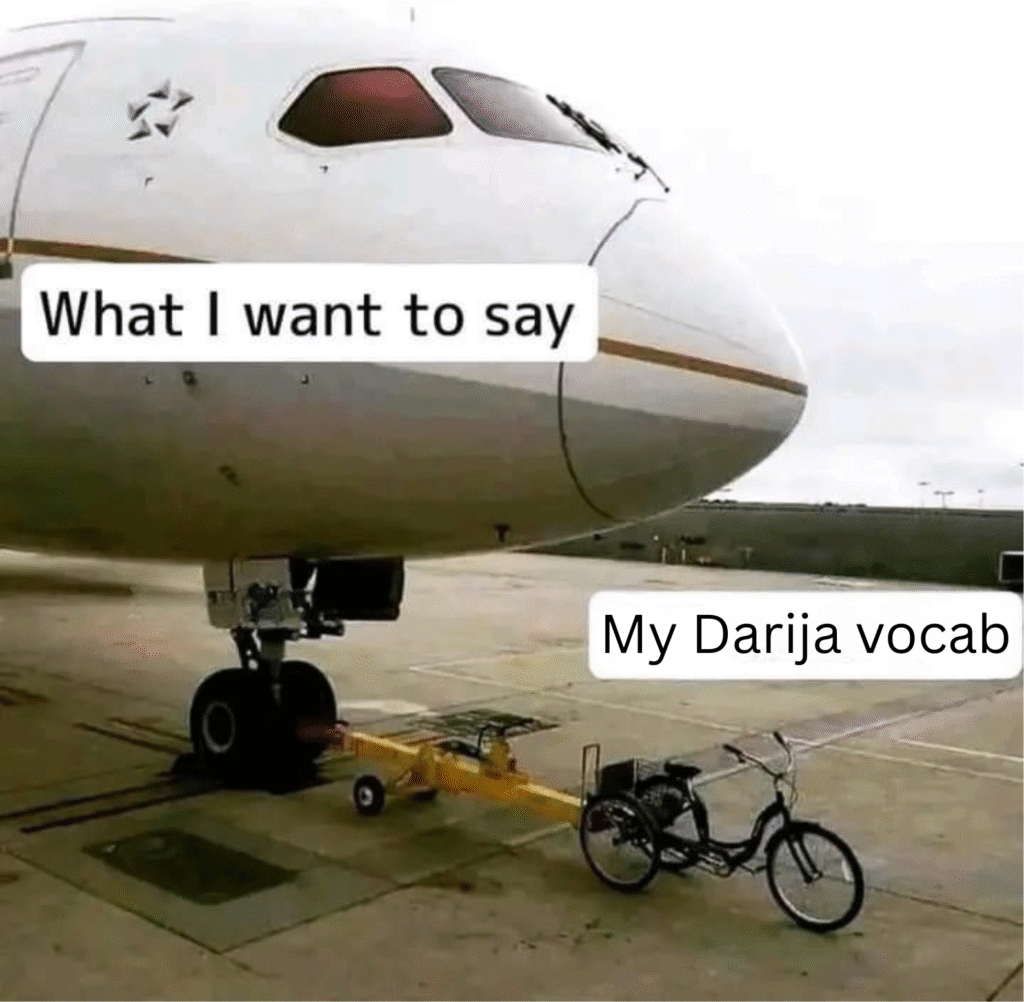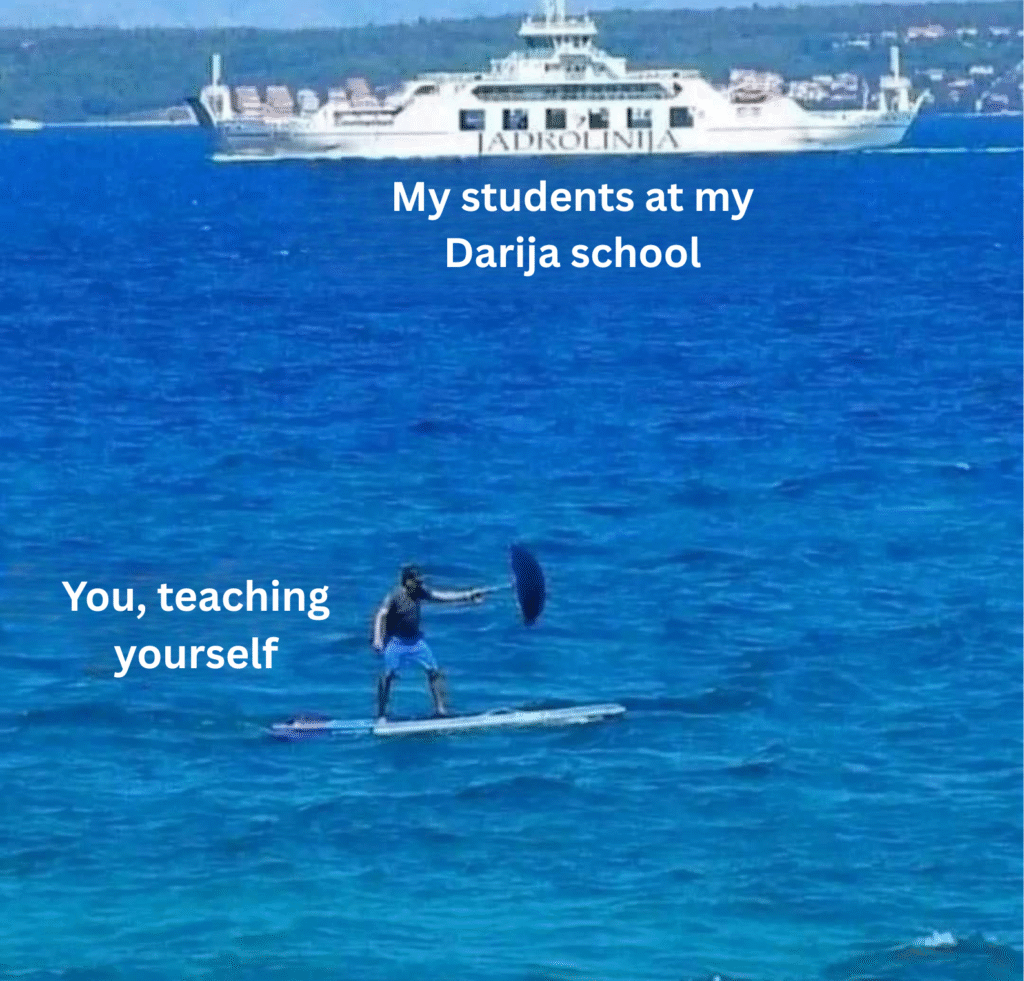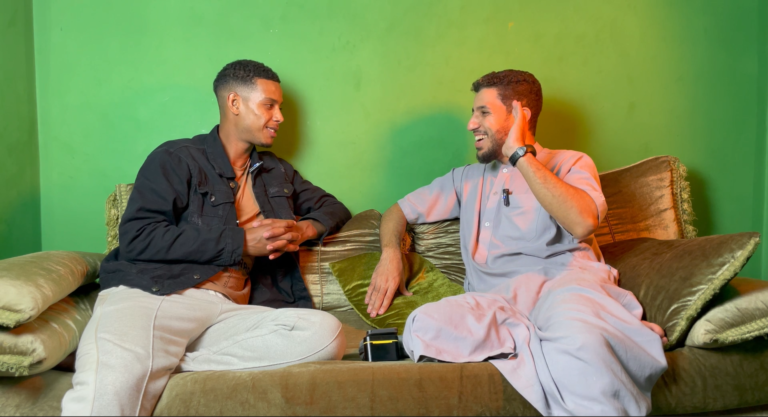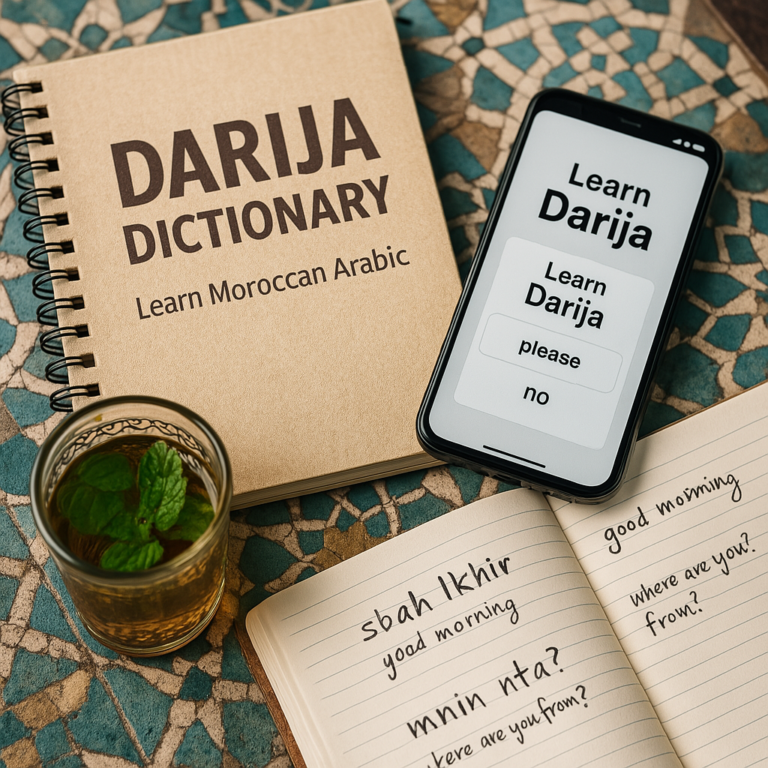Learn Darija the Smart Way: 9 Beginner Mistakes (and How to Fix Them Fast)
If you’ve ever tried to learn Moroccan Arabic (Darija), you already know it’s not your average language. It’s fast, full of personality, and sometimes makes you wonder – “Wait… did I just hear French, Arabic, and Spanish in the same sentence?” 😅
Many beginners jump in with big motivation – and that’s great! But after a few weeks, things start getting confusing: “Why does everyone say it differently?” or “How come I can understand nothing from Moroccan movies?”
Over the years in my Arabic teaching career, I’ve seen the same beginner mistakes appear again and again. The good news? Once you know what they are, you can skip the frustration and focus on what really helps you learn faster.
After reading this post, I’ll be able to learn Darija the right way from the start – avoid these 9 beginner mistakes and make your Moroccan Arabic journey smoother, faster, and more fun.
So grab your mint tea – or your Panashi if you’re not a mint tea fan like some of my Swedish Darija students – relax, and let’s dive in!
1. Expecting Fluency Too Fast
Many of the new students I meet come to me full of excitement – and I love that energy! But then comes the classic line during our consultation call:
“Ustad Muhammad, I’m traveling to Morocco in 3 months and I really want to be fluent in Darija before I go!”
At that moment, I become the dream breaker 😅 – the one who has to gently say:
“That’s not going to happen… but here’s what can happen.”
Language fluency – especially in Darija – isn’t something you can “speedrun” like a video game. Those YouTube videos that say “I learned Arabic in 3 months!” are usually talking about learning how to say “How are you?”, “Where’s the bus?”, and “I want couscous.” – not real conversations about your goals, opinions, or Moroccan culture.
And let’s be honest – those language YouTubers have all the time in the world to study 4 to 8 hours a day, film their progress, and make a video about it. That’s literally their full-time job. You, on the other hand, have a life – work, studies, family, and everything else competing for your time. So don’t compare your progress to theirs.
What I usually tell my students is this: in two months, you can read and write Arabic script, count from 0 to 100, tell time, and talk about your daily life – what you did yesterday, what you’re doing today, and what you’ll do tomorrow.
That’s real progress – the kind that actually lasts.
I always tell them that fluency is a long journey, but it’s also a fun one, full of small wins that will make you proud every step of the way.
So, instead of trying to “be fluent before your flight,” focus on building your Darija foundation. You’ll arrive in Morocco ready to connect with people, not just memorize phrases.

2. Ignoring Vocabulary Balance
One of the biggest mistakes I see when people start to learn Darija is focusing on the wrong type of vocabulary. Many of my new students come to me with a very specific goal… for example:
“Ustad Muhammad, I want to learn the family vocabulary so I can talk to my Moroccan in-laws.”
That’s great! But here’s what usually happens: they focus so much on family words that they forget to learn the verbs and adjectives they actually need to hold a real conversation. You can know all the words for “uncle” and “cousin,” but if you can’t say “I woke up late,” “I’m cooking couscous,” or “We’re visiting tomorrow,” then your conversations will crash before they even take off.
Learning Darija is all about balance – building a vocabulary that matches your current level and daily needs. If you can talk about your day, your plans, and your feelings, you’ll already sound much more natural in Moroccan Arabic than someone memorizing random word lists from a textbook.

3. Stuffing too much vocabulary in short period of time
Here’s another trap I see all the time when people try to learn Moroccan Arabic (Darija) – they try to stuff too many words into their brains at once.
I have a friend I go to the mosque with every day. A few months ago, he started learning English from YouTube. One day he told me,
“I feel hopeless, I keep forgetting everything I learn.”
So I asked him, “How many words do you learn per day?”
He said, “About half a page from a book or 5 minutes from a video.”
I was like, “Bro… that’s around 25 to 30 words a day! No wonder your brain’s begging for mercy.” 😂
It’s the same when learning Darija – if you try to memorize too much vocabulary too quickly, your brain won’t retain it. Instead, focus on 1 to 3 new words a day, but make sure you learn them through sentences. That way, your brain connects meaning, sound, and context – and you’ll remember them naturally.
I also recommend using Anki app, a free flashcard app that helps you review words just before you forget them. Most of my Darija students who use it consistently never go back to random note-taking.
So go easy on yourself – learning Darija is a marathon, not a sprint. Slow, consistent practice beats fast and forgettable every single time.

4. Avoiding Speaking Practice
Most people struggle with speaking practice – not because they can’t do it, but because it feels uncomfortable. You know that awkward moment when your brain is shouting “say something!” but your tongue just gives up? Yeah, every Darija learner has been there.
And because it’s uncomfortable, most people avoid it.
And because they avoid it, they don’t improve.
And because they don’t improve… they quit.
It’s a cycle that keeps repeating.
Learning Darija isn’t just about memorizing words – it’s about saying them out loud, even when it feels messy or weird. When your brain hurts trying to remember the right word, that’s actually where progress happens. That “ugh, this is hard” moment? It’s your neurons building real connections.

If you only focus on writing or vocab, you’ll end up like that meme above – all polished in one area, but still struggling to form sentences in real time.
That’s why in my Darija Learner Pro School, we do weekly live speaking sessions – small, supportive groups where you get to practice speaking with real people (not just talking to your screen).

We also have female-only group sessions (which I can’t show here for privacy reasons), but the idea is the same – it’s a safe, chill space to practice and grow. No judgment, no stress, just real progress one conversation at a time.
So if you’ve been avoiding speaking practice because it feels uncomfortable – push through it. That’s where the magic happens.
Now that we’ve tackled the “speaking fear,” let’s talk about another sneaky progress killer…
5. Studying Without Focus
Many Darija learners start with great energy but spread it in every direction – one day they’re practicing pronunciation, the next they’re memorizing colors, and suddenly they’re trying to master Moroccan proverbs they can’t even pronounce yet.

That’s like trying to climb a staircase by skipping every other step (just like the meme 👆). It’s not that you won’t reach the top – but you’ll trip, fall, and end up frustrated halfway.
I see this often when students get obsessed with how they pronounce words, especially the tricky Arabic letters that don’t exist in English. Take the letter “ح” (Ha), for example. I tell my students it’s like sipping a soda – that little “hhhh” sound after a gulp. 🥤 Once they relax, repeat it 50–100 times, and stop overthinking, they nail it perfectly.
I always tell them to focus on one thing at a time. Don’t try to fix your pronunciation, grammar, and vocabulary all at once. Build one skill steadily – it’s much more effective (and way less painful).
If you’re still not sure where to begin, then I recommend you read my full Darija Beginner’s Guide 2025 where I walk you I show you step-by-step how to build your foundation.
And once you’ve learned to focus, the next big challenge begins – staying consistent.
6. Being Inconsistent.
If there is one thing I want you to take from this post, staying consistency would be the one.
Consistency is one of the hardest parts of learning Darija – and one of the most important.
It’s like training for a sport: if you stop for too long, your muscles forget the movement.
And when you come back, it feels like starting all over again 😅
One of my Italian students… Elena, just came back after taking a break for an intensive French course. She had made amazing progress in Darija – she could read, write, and hold simple conversations. But after only two months of focusing only on French, she forgot many common words and struggled to form sentences again. It honestly felt painful to watch – because I knew how much work she had put in.
That’s what happens when you stop practicing for too long. Your brain begins to “declutter” unused information – like cleaning up storage space. But the good news is: you can prevent that easily.
Even 10 minutes a day of reviewing your Anki flashcards, reading short Darija texts, or listening to Moroccan YouTubers keeps your skills alive and strong.
And here is another important thing for you to consider: If you need extra motivation, you can find a free accountability partner on apps like HelloTalk or Tandem – someone who’s also learning and wants to stay consistent. You can check in with each other daily, share progress, and keep the learning energy alive.
But if you prefer structured accountability – with weekly reminders, speaking sessions, and a supportive community of learners – that’s exactly what I offer inside Darija Learner Pro School.
You’ll always have someone cheering you on, and you will have me inviting you to join lessons even on the days when you don’t feel like studying.
Because trust me – staying consistent is much easier when you’re surrounded by people walking the same path.

7. Relying on Word-for-Word Translation.
Most Darija beginners (and I mean most) try to translate directly from their native language. You think in English → translate → speak Darija… and the result? Well, it often sounds like building a wall with the wrong bricks.
For example, imagine you want to say “I’m crazy about you” in Darija. The literal translation would be “Ana kan7ma9 ʿlik” (أنا كانحماق عليك) – but hold on, that doesn’t quite mean I love you! 😅
In Moroccan context, that phrase usually means “I act silly or crazy with you” – like, “I joke around and say nonsense, and you somehow believe it.” So if you use it to confess your love… well, the other person might just laugh and say, “Wait, what?” 😂
The safer (and actually romantic) version would be “Ana kanmot 3lik” (أنا كانموت عليك) — literally “I die for you,” which Moroccans use to show deep affection. See? Word-for-word translation can make you sound hilarious or confusing – and that’s why learning Darija expressions in context is so important.
So instead of word-for-word translation, learn expressions the way Moroccans actually say them. Language and culture go hand in hand – and once you start thinking in Darija, conversations flow naturally (and people will love how authentic you sound).

8. Jumping to advanced vocabulary too soon
Some Darija learners go a little too far trying to sound advanced. They’ll tell me, “Ustad Muhammad, I want to learn every verb for to go, to walk, to wander, to travel, to stroll casually while holding mint tea…” 😅

And I’m like, “Khoya, chill – you only need one or two verbs for that!”
In Darija, verbs are flexible. One good, well-used verb like Msha (to go) or Dar(He did) can fit in many situations depending on the context. You don’t need to memorize ten similar verbs when just one will do the job.
Focus on mastering a smaller number of useful, high-frequency verbs, and learn them deeply – in sentences, in conversations, with real context. That’s how your brain connects meaning naturally.
Remember that the language isn’t about knowing every word in the dictionary. It’s about knowing how to use the right word in the right moment.
Once you master the basics, you can explore more resources like 5 Best Darija Dictionaries & Apps to help you stay consistent.
And speaking of context… 👇
9. Skipping Culture & Context
The last mistake I see some of my students make when they learn Darija is treating it like just another language – when in reality, it’s a whole culture in motion.
Darija is not just vocabulary and grammar. It’s facial expressions, tone, humor, and warmth.

For example, one of my Canadian students once asked if she should wish a Moroccan mom “Have a nice day” on WhatsApp – something perfectly normal and polite in Canada.
I told her, “Nooo, that’s not really how it works here 😅.”
In Moroccan culture, we don’t really say “Have a good day.” Instead, we use expressions filled with spirituality and care, like:
- Llah y3awnk – May God help you.
- Fiyad Llah – You’re in God’s hands.
- Bslama – Literally, “with peace.”
And when you greet someone, it’s never a quick “Hi, how are you?” – we really care to know how you’re doing.
You might hear:
“Kidayra b seha?” (How’s your health?)
“Kidayrin l3a2ila?” (How’s your family?)
“Kolshi bikhir?” (Everything okay?)
Even if you answered the first question, Moroccans will often ask two or three more. It’s not repetition – it’s a form of caring for the other person. ❤️
Here’s a real Moroccan mom showing exactly what I mean – listen to how caring and detailed she is when asking about her new family friend.
That’s why when you learn Darija, it’s not just about grammar; it’s about belonging. You learn to listen beyond words – to intentions and emotion.
If you’ve been self-studying Darija and feel like you’re “almost fluent” – hold on 😅. You might be missing some hidden layers that only show up in real conversations.
You can book my free Darija Level Assessment and find out where you truly stand – it’s a short test that helps you see your strengths and what you need to work on next.

Frequently Asked Questions About Learning Darija (Moroccan Arabic):
Q: Is Darija hard to learn?
A: It can seem tricky at first which would take a bit of time to adjust because Moroccan Arabic blends Arabic with Amazigh, French, and Spanish influences – but once you focus on listening and speaking daily, it becomes surprisingly intuitive.
Q: What’s the best way to learn Darija?
A: Immerse yourself in daily phrases – listen to native speakers, watch Moroccan YouTube channels, and practice through my Darija Learner Pro School for structured fluency.
Q: Can I learn Darija online?
A: Absolutely. Online lessons and audio materials (like my 3D Travel Audio eBook) help you learn from anywhere in the world.
Q: How long does it take to learn Moroccan Arabic?
A: With consistent effort, you can hold real conversations in as little as 3–4 months, especially with guided practice.






